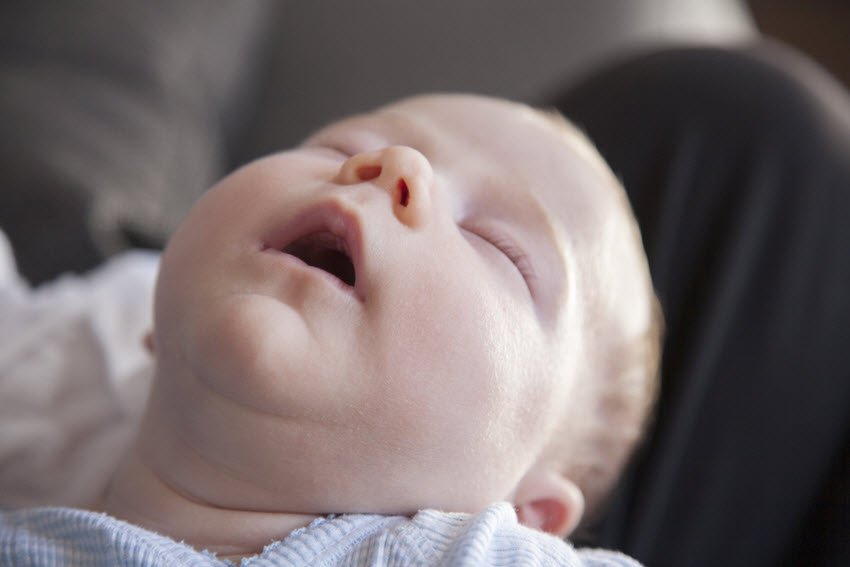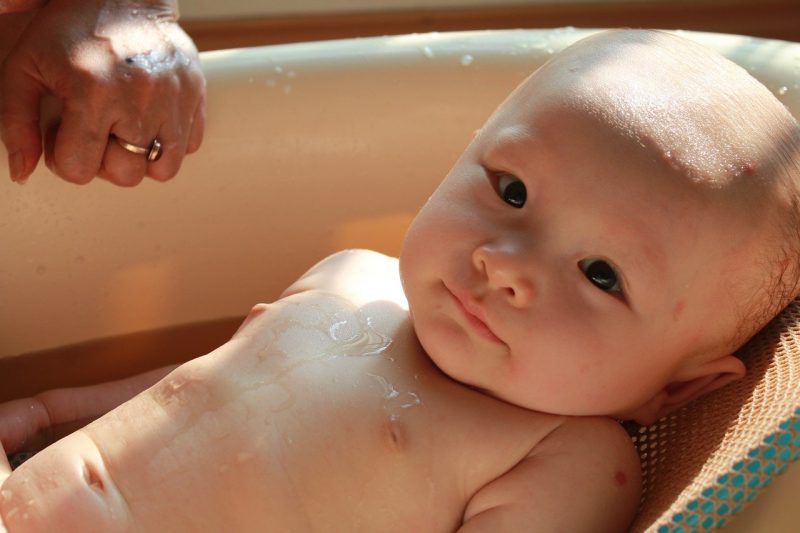Earlier today, my daughter walks into the living room giggling. She informed me that my grandson had fallen asleep with his mouth wide open. Then, she held out the video baby monitor so that I could see myself. He was sleeping soundly with his mouth wide open. I’ve never seen a baby sleep with their mouth open before. None of my three did that. At least, not that I noticed. Which led to me searching for a reason why newborns sleep with mouth open.
In this article
Is It Safe?
View in gallery
Most people wonder whether it is safe for a baby to sleep with their mouth open. I was curious about every aspect of this, including whether it is safe. Short term, no damage will be done. Long term, however, babies are more likely to develop a slew of problems from sleeping with their mouths open. It makes them more likely to develop asthma, have sleep problems that result in behavior problems, and they can develop problems with their mouth. They may have a harder time eating or learning how to move their tongue. If newborns sleep with mouth open a few times, it’s probably not a cause for concern. If you notice that it is happening frequently, it’s important to delve into some research to determine why.
Medical Conditions That Cause Newborns Sleep With Mouth Open
Certain medical conditions can cause a newborn to sleep with their mouth open. If they already have asthma or allergies this could be the culprit. When you don’t know why it’s important to keep an eye on your baby. If their lips or tongue are frequently dry, that is a good indicator that your baby is sleeping with their mouth open. Checking on them while they are asleep is the easiest way to determine if they are sleeping with their mouth open. If you find that this is happening regularly, consult your pediatrician, and take proactive measures.
Allergies
Some babies develop allergies early on. This results in an increased production of mucous, which can block their airway. Because of this, babies may sleep with their heads tilted back and their mouth open. This position makes it easier for them to breathe if they have mucous in their throat. If they are simply sleeping with their mouth open, it could be that their nose is congested. Cleaning it out with a nasal aspirator can help them breathe easier and sleep better.
Sleep Apnea
Sleep apnea is a condition that causes a person to quit breathing in their sleep. Often, they will start breathing again on their own, but there are cases that are fatal. Newborns sleeping with mouth open are a common symptom. Other sleep apnea symptoms consist of:
- snoring
- pauses in breathing
- restless sleep
- sleep terrors
- coughing
- choking
- consistently tired despite getting adequate sleep
If you’re concerned that your newborn has sleep apnea, it’s important to consult your pediatrician immediately. This condition occurs in a small fraction of newborns, but it’s always better to be safe instead of sorry.
Colds
Colds seem to plague newborn babies from the second they leave the womb. The additional mucous can accumulate in their airway passages, making it more difficult to breathe. It can also result in a stuffy nose. If you think your newborn sleeping with mouth open is because of a cold, try suctioning their nose to see if they sleep with their mouth closed. You can also close their mouth in their sleep, and see if they wake up. If they are not able to breathe as well as they normally should, they will wake up. This is an indicator that they have too much mucous.
Newborn Sleeping With Mouth Open: What To Do?
View in gallery
If you are concerned, it’s important to call your pediatrician. Newborn babies can have a wealth of problems that can result in something as minor as them sleeping with their mouth open. If it’s a smaller inconvenience, such as too much mucous, you want to find a solution to prevent future problems, such as them having problems eating. These common remedies will help your baby breathe better and get a more restful sleep.
Use A Humidifier
Babies breathing in dry air can increase mucous production. This can happen to all of us, but babies have premature nasal passages and tiny airways, so that small increase can spell major breathing problems. Using a humidifier to increase the moisture in the air will decrease how much mucous they have, helping them breathe better.
Suction It Out
Suctioning a baby’s nose or mouth can help remove access mucous that is making it hard to breathe. However, it’s important to not overdo this. Use the nasal syringe to remove the mucous and then stop. If you suction too much or when there is not an excessive amount of mucous, it will actually increase mucous production and be counterproductive.
Pick Up An Air Filter
One of the most common causes of extra snot is poor air quality. There could also be allergens in the air that bother your baby’s allergies. For example, if a person smokes in the home the smoke can drift into other areas of the house, resulting in your little one having more mucous. An air filter will instantly improve air quality and might decrease mucous.
Remove Allergens If Possible
If you have pets, clean regularly to remove pet dander from the house. Vacuum up dog hair and wipe couches to remove pet dander from cats. Smoke outside, and don’t forget to let some fresh air inside. An air filter is a great way to improve air quality, but cleaning regularly and performing regular maintenance can go a long way. For example, replacing the filter on a furnace can help reduce the amount of dust in the air, and provide cleaner air for the whole family to breathe. Vacuuming regularly is another great way to remove allergens on furniture. This blog is full of tips.
Give Newborns A Warm Bath
View in gallery
If you are blessed enough to have a newborn that enjoys baths, this could be the answer to your prayers. If a baby finds the bath relaxing, it can instantly cure fussiness. Also, the warm water can help thin out mucous so that it can drain easier, meaning that they will be both calmer and less stuffy.
Use Saline Drops
Saline drops are easy to use and highly effective. If a baby has mucous that is too thick to drain properly, saline drops can be used to make it thinner. A few drops inside their nose will help the snot come out of their nose. You’ll wind up wiping their nose every few minutes while it comes out, but your baby will be able to breathe much easier. Some pediatricians recommend using a nasal syringe to put 1-2 drops of a saline solution further up in the nose for extra thick mucous.
You should only use saline drops as directed. Most saline drops are for the nose only. If your baby is coughing, do not put saline drops in their mouth or throat.
Sit Babies Upright
Sometimes, sitting a newborn in an upright position can make it easier to handle mucous. Hold them upright, or set them in a bouncy seat or swing. Being in a horizontal position frequently can make it harder for the body to deal with the additional congestion, and it can make them stuffy longer.
It’s important to note that there are plenty of risks that come with this if it is not done properly. For example, you should never prop a baby up with pillows and blankets if they are by themselves. This can be a suffocation hazard. Instead, make sure that you have time to stay with them to guarantee their safety.
When To Call A Doctor
The most common cause of newborns sleeping with mouth open is congestion. Many of these home remedies can instantly help both you and your baby find relief, but there are times that call for a trip to the local hospital or pediatrician. If you notice that your newborn is having trouble breathing, is choking or turning blue or purple, call 911 or take them to the emergency room immediately. These are all signs that they are not breathing, or having a lot of trouble breathing.
If you’re concerned, it is time to call a doctor. It’s always better to call the doctor and be told that there is nothing wrong with your baby than to feel silly, not call and there be something wrong. It’s never a bad idea to double-check with your pediatrician if you’re concerned. If your baby has been extra fussy lately, it’s a great idea to call the doctor to double-check.
When your newborn sleeps with mouth open, it can be adorable at first. If it happens regularly, pay attention to these signs, use home remedies to relieve congestion if necessary, and make sure to call your pediatrician to prevent future problems that can happen if your baby keeps sleeping with their mouth open.






